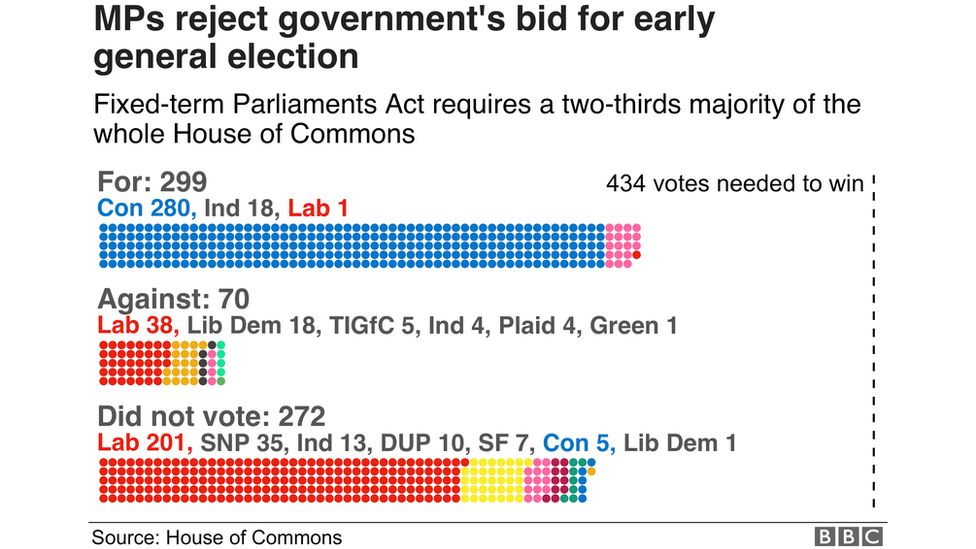Brexit: PM to try again for 12 December election after MPs reject plan
- Published
The government failed to secure the necessary two-thirds of MPs' votes
Boris Johnson is to try again for a 12 December general election on Tuesday - despite MPs rejecting his plan.
The prime minister will publish a bill that would only need a simple majority to succeed - not two thirds as required in previous attempts.
But he would still need support from Lib Dems and the SNP for it to pass.
Mr Johnson told MPs Parliament was "dysfunctional" and could "no longer keep this country hostage" but Labour said the PM could not be trusted.
The Commons backed the government's election motion by 299 to 70 - well short of the two-thirds majority needed under the Fixed-Term Parliaments Act.
All but five Conservative MPs backed the motion - but the vast majority of Labour MPs abstained, along with the SNP and DUP. All but one Lib Dem MPs voted against it.
The vote came after the PM officially accepted the EU's offer of an extension to the Brexit process to 31 January.
In a letter to EU officials, Mr Johnson said the further three-month delay - which he insists was forced upon him by Parliament - was "unwanted".
This means the UK will not now leave the EU on Thursday - 31 October - a promise Mr Johnson had repeatedly made since he became prime minister.
Mr Johnson said he would persist with his efforts to get an early election, telling MPs that "one way or another" the current deadlock had to be broken.
Commons leader Jacob Rees-Mogg said the government wants the House of Commons to debate all stages of a bill for a 12 December election on Tuesday.
Usually a bill is debated over the course of several days, but Mr Rees-Mogg said the legislation would be "extremely short, simple, and limited in scope".
The bill would also have to pass through the House of Lords at a later date if it is to come into effect.
He added that the government would not be bringing back its Withdrawal Agreement Bill, required to put Mr Johnson's Brexit deal into law.

The legislation for an election the PM is proposing for Tuesday would require a lower threshold for approval and, crucially, the Liberal Democrats and the SNP have indicated they might be prepared to support it.
The DUP, which opposes Mr Johnson's Brexit agreement and which abstained in Monday's vote, could also potentially come on board.
However, there are arguments over the date of an election.
Ahead of the vote on Tuesday, BBC political correspondent Nick Eardley indicated that opposition parties had yet to commit to backing the bill.
Allow X content?
This article contains content provided by X. We ask for your permission before anything is loaded, as they may be using cookies and other technologies. You may want to read X’s cookie policy, external and privacy policy, external before accepting. To view this content choose ‘accept and continue’.

The Lib Dems and SNP want Monday, 9 December, which they say will prevent any chance of the prime minister's Brexit deal being approved before Parliament is dissolved.
Parliament has to be dissolved a minimum of 25 working days before the date of an election to allow sufficient preparations to take place.
The government's pledge not to bring back its Brexit deal bill before Parliament is dissolved for an election is designed to assuage the concerns of the SNP and Lib Dems - who want to fight the election on a platform of stopping Brexit entirely.
'Very similar'
But No 10 is currently holding firm on its preferred election date of 12 December.
It maintains it would be very difficult for an election bill to pass through both the Commons and the Lords, and receive Royal Assent by 00:01 on Friday in order to meet a 9 December deadline.
A No 10 source said the government's bill would be "very similar" to that proposed by the Lib Dems and the SNP - but with the 12 December election date enshrined in law, to reassure those who worry that Mr Johnson could change his mind.
'Bewildered'
Negotiations between the two sides over a compromise are reportedly taking place in Westminster, although Lib Dem leader Jo Swinson has said, as it stands, she will not agree to the 12 December date.
"He's (Boris Johnson) going for a different plan," she told MPs. "This just raises a suspicion... and this is not a man who you can trust."
Mr Johnson told MPs voters would be "absolutely bewildered" by Labour leader Jeremy Corbyn's apparent resistance to an election.
Mr Corbyn said he would study the details of the legislation but would only support an election once a no-deal Brexit had been taken off the table.
He also wants assurances that students will not be "disenfranchised" if the vote is held outside term time.
Many Labour MPs remain adamantly opposed to an election in any circumstances, amid concerns about the party's poor poll ratings and confusion over the party's Brexit policy of negotiating a new deal and holding another referendum.
Meanwhile, the BBC understands the government has "stood down" its Operation Yellowhammer contingency planning for a no-deal exit, while it has also paused its £100m Get Ready for Brexit on 31 October campaign.
